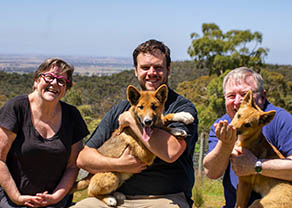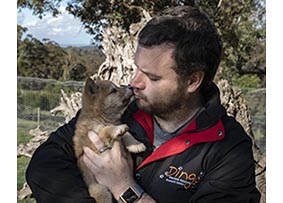Kevin Newman: Humans of BioSciences
Meet Kevin Newman, who has just completed his Honours with Professor Michael McCarthy in the Quantitative and Applied Ecology Group (QAEco). Kevin’s interest in animals and the natural world has inspired him to explore different careers in science, from aspiring to be a vet and a schoolteacher, and working in animal welfare, before discovering his passion for research. During honours, Kevin developed a case study for optimising surveillance methods to increase detections of the critically endangered Leadbeater's possum across a specific survey site. Utilising survey methods such as camera trapping, spotlighting and thermal cameras, his research is crucial to support monitoring programs that involve threatened or endangered species.
 What problem are you trying to solve with your research?
What problem are you trying to solve with your research?
My Honours research focused on optimising surveillance methods in order to maximise the number of detections of a target species across a survey site. For example, say you need to survey a species across several sites. How do you know how many camera traps to set up without blowing out your budget? By considering the budget available for the survey, I developed an equation that can be used by researchers in planning their surveying method, resulting in the maximum number of detections of their species of interest across multiple sites within a survey (i.e. the optimal survey method).
Survey methods include camera trapping, spotlighting, thermal cameras, etc. This research is particularly important for monitoring programs that involve threatened or endangered species, as we are often trying to find individuals or colonies for protection but have a very limited budget. I used the solutions I developed on a case study for Leadbeater's possum (Gymnobelidus leadbeateri). These are a critically endangered species and their habitat is under threat by logging practices. Detecting individuals is difficult as they require a timber harvesting exclusion zone to be established. My research showed that the current survey protocols that were developed by the Arthur Rylah Institute are the optimal protocols for their available survey budgets and detection rates.

What got you into science in the first place?
I have always been interested in science. When I was young, I was keen on pulling things apart and putting them back together to find out how they worked. My dad worked in telecommunications, so we always had random bits of telephones lying around for me to tinker with. As I got older, my interest in animals and the natural world developed and I thought I would end up as a vet! As I went through school, science was always my favourite class and I loved learning about how everything interacts with each other.
After working for a few years in the animal welfare space, I decided to go back to university as a mature aged student and study to become a teacher. This plan went awry when I discovered a love of research instead and ended up following that path into my Honours.
What do you enjoy doing outside of science?
I spend a lot of my time at the Dingo Discovery Sanctuary and Research Centre as the sanctuary supervisor there, which means I get to work with Australia's native apex predator the Dingo! I help manage the sanctuary, the volunteers and run education sessions as well as tours so that visitors can get up close and personal with dingoes and learn more about them. When I'm not there, I work for Second Chance Animal Rescue doing fundraising and communications. I also enjoy getting out for walks in nature, trying to spot animals in the wild, and getting out of the suburbs.
Do you have any advice for undergraduate students?
Enjoy your time in undergrad. You learn so much and it gives you an opportunity to really broaden your knowledge base and your skills. As you continue through the years, keep an open mind as to what the future might hold because you never know where you might end up! Also, do not be afraid to ask questions. Your demonstrators and lecturers want to help you learn and are there to support you.
'Humans of BioSciences' is a special series to introduce the School of BioSciences' undergrad and postgrad students, our academics, professional staff and associates.